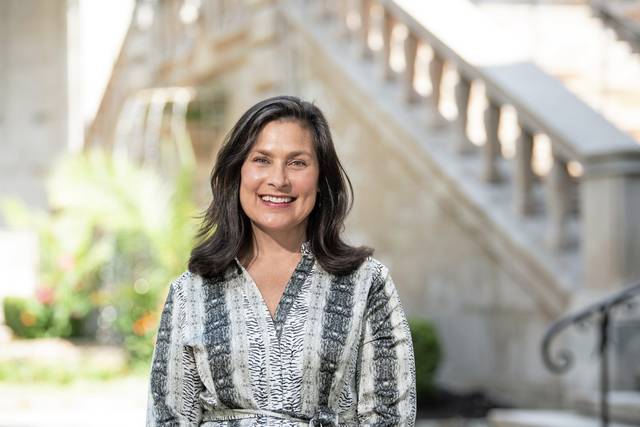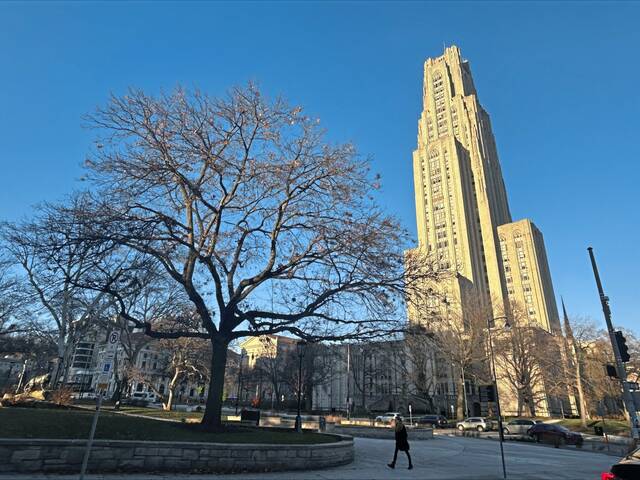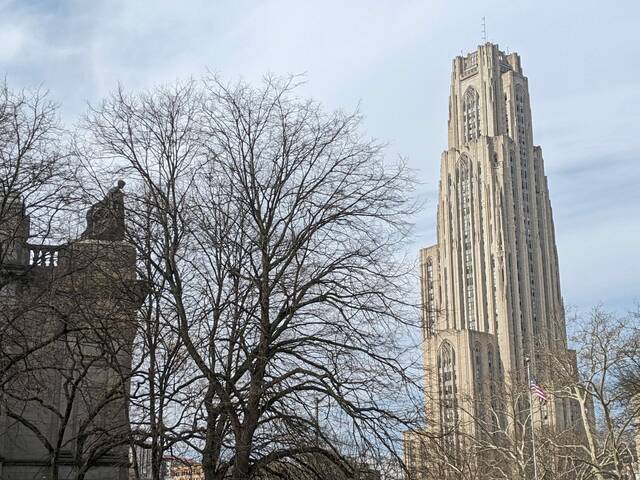The University of Pittsburgh named a new director of the Nationality Rooms and Intercultural Exchange Programs — someone who is very familiar with the many benefits students can reap from the cultural staple.
Kati Csoman, who received her undergraduate and graduate degrees from Pitt, assumed the role on Tuesday. She succeeds E. Maxine Bruhns, who directed the Nationality Rooms program from 1965 until her death in 2020.
“She took me under her wing,” Csoman said of Bruhns, who she said was a mentor during her undergraduate studies. “She modeled the behavior that is appropriate in intercultural studies.”
Csoman’s relationship with the Nationality Rooms dates back to her undergraduate days, when, in 1988, she received a scholarship from the Hungarian Room Committee. Csoman — a Hungarian-American whose father came to the United States from Hungary in 1957 — was able to visit the country for a study abroad trip through the scholarship.
“It opened the world up for me,” she said of the experience, which allowed her to study Hungarian language and culture. She also got to meet relatives who lived in a village east of Budapest.
Because of her ties to the program, Csoman said she knew the new role would be a perfect fit.
“It was a position and it’s a unit of the university that I’ve always felt this deep affiliation and affinity with,” Csoman said. “When the job became available, I felt very compelled to apply for the position because I care so much.”
After finishing her undergraduate studies, she spent a year working at the U.S. Embassy in Budapest on a State Department fellowship. She returned to obtain a master’s from Pitt’s Graduate School of Public and International Affairs.
Csoman went on to spend about 20 years at Juniata College in Huntingdon, rising to serve as the dean of International Education. In that role, she chaired the International Education Committee and the Global Village Advisory Council and won the 2017 McDowell Pinnacle Leadership Award, among other recognitions. She also completed a three-year term on the board of the Association of International Education Administrators.
She has long been active in the Hungarian-American community in the Pittsburgh region, previously serving as chair and secretary for Pitt’s Hungarian Room Committee.
Between Juniata and Pitt, she worked as an associate director for global program innovation and an assistant teaching professor at Penn State University.
In her new position, Csoman will lead operations of Pitt’s 31 museum-quality classrooms and intercultural programming that involves tours, student groups, scholarships, faculty grants and cultural and educational outreach and programs.
“At a time when international education is re-envisioning the field, there is no doubt that Kati’s vision for a communal, creative and critical approach to advancing future projects, programs and activities of the Nationality Rooms will make critical interventions that align with Pitt’s mission and strategic priorities,” said Ariel C. Armony, vice provost for global affairs and director of the University Center for International Studies. “Our team is excited to welcome Kati to the UCIS family.”
The concept for the Nationality Rooms was conceived by Pitt Chancellor John Gabbert Bowman in 1926, the year construction crews broke ground on the 42-story Cathedral of Learning. They were meant to function as classrooms while showcasing the cultures of Pittsburgh’s immigrant populations.
Among the first rooms dedicated were the German, Russian, Scottish and Swedish rooms in 1938, followed by the Czechoslovak, Yugoslav, Hungarian and Chinese rooms in 1939 and the Polish and Lithuanian rooms in 1940.
Tours of the Nationality Rooms are currently conducted online. In-person tours are scheduled to resume on Sept. 1 by appointment.
While Csoman said she’s eager to resume in-person activities, she said she’s also aiming to put virtual programming to good use.
“It’s great because I think the virtual engagement also opens it up to a broader geographic range of participation and also to people who are limited in mobility or more comfortable in their own space,” she said.
Thematic tours — which discuss themes ranging from fairytales to women represented in the rooms — are available online.
Csoman said she hopes to incorporate more activities for children who visit the rooms on family trips or field trips. She said she wants to find new ways to get the community involved in a “wonderful treasure that is so important to the university.”
While the Nationality Rooms are an important piece of the Pitt community, she said she wants to make sure everyone in the broader community also feels welcome to visit the rooms. Plus, she said, she hopes to expand connections with other institutions and organizations throughout the region.
“I want the community to feel welcome and engaged — not that they haven’t — but to welcome and engage the campus community and, more broadly, the community, Pittsburgh and beyond,” Csoman said. “It’s such an amazing cultural treasure.”








